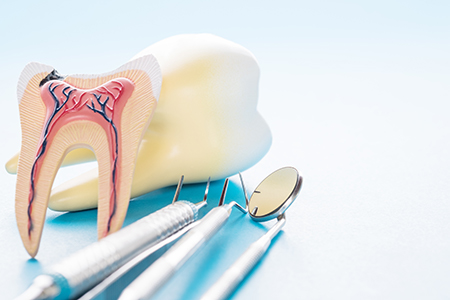

Being told that a tooth needs a root canal can feel unsettling, but modern endodontic care is designed to be predictable, comfortable, and aimed at preserving your natural smile. Root canal therapy treats the portion of the tooth that is infected or inflamed, stopping pain and protecting the surrounding bone and tissues from further damage.
The team at Liberty Dental Care PC by Park One Dental combines contemporary instruments with a gentle approach to make the process as smooth as possible. Our focus is on restoring function and comfort while helping you keep your natural tooth whenever appropriate.
Keeping a natural tooth provides advantages that go beyond appearance. A preserved tooth maintains bite alignment, supports neighboring teeth, and helps preserve the jawbone. Whenever a tooth can be saved safely, root canal therapy is often the best route to maintain oral health and long-term function.
Thanks to advances in techniques and materials, the prognosis for root canal-treated teeth has improved significantly. Dentists can clean and seal complex canal systems more thoroughly than ever, reducing the likelihood of recurrent infection and extending the lifespan of treated teeth.
Choosing treatment that retains your natural tooth can also simplify future dental care. When a treated tooth is restored properly — usually with a crown or other durable restoration — it can often continue to serve you reliably for many years.

Teeth don’t always signal trouble in the same way, but there are common indicators that the inner tissues are affected. Discomfort that lingers after eating hot or cold foods, pain when biting, and unusual sensitivity can all point to pulp inflammation or infection.
Other warning signs to watch for include visible darkening of a tooth after an injury, swelling around the gumline, or a persistent toothache that interferes with sleep or daily activities. Sometimes a tooth will show radiographic changes before symptoms become obvious, which is why regular exams and X-rays matter.
Not every ache requires a root canal, but timely assessment is important. Early diagnosis helps the dentist determine whether root canal therapy, targeted restorative work, or another form of care is the most appropriate way to protect your oral health.
Although each situation is unique, here are some common clinical signs that often lead to a recommendation for root canal treatment:
When pain is persistent, sharp, or wakes you at night, it is frequently associated with compromised pulp tissue. This kind of pain often prompts prompt evaluation and, when indicated, endodontic treatment.
Sensitivity that lingers long after exposure to hot or cold substances can indicate that the nerve inside the tooth is irritated or damaged and may not recover without treatment.
Discomfort when biting down — even lightly — can signal inflammation or infection within the tooth’s canal system or an underlying structural problem that requires attention.
A tooth that becomes grayish or darker after trauma or over time can be a sign that the internal tissues have been damaged and are no longer healthy.
A compromised tooth structure from a chip or crack can expose the pulp to bacteria. When the inner tissues are affected, root canal therapy may be necessary to save the tooth.
Local swelling, especially when accompanied by a pimple-like bump on the gum (a draining sinus), often points to infection at the root tip and calls for timely treatment.
In some cases, infection or bone loss around an affected tooth can result in mobility. Treating the source of infection helps address the underlying cause and can improve stability as healing occurs.

Delaying care when a tooth is compromised increases the risk of more extensive infection, increased pain, and damage to surrounding tissues. Early evaluation gives the dentist more options for preserving the tooth and minimizing complications.
Some teeth with significant internal damage show few outward symptoms at first but reveal problems on X-rays. Routine dental exams and imaging allow clinicians to identify these issues early and recommend appropriate care before the situation worsens.
Timely treatment frequently reduces the number of visits required and improves outcomes. Addressing the problem while it is confined to the tooth — rather than allowing it to spread — supports faster healing and a more predictable prognosis.
Today’s root canal visits prioritize comfort and precision. Treatment usually begins with local anesthesia to numb the area so the procedure is comfortable, and the dentist will isolate the tooth to keep it dry and visible throughout the appointment.
The clinician then accesses the canal system, gently removes inflamed or infected tissue, and shapes and cleans the internal spaces using techniques designed to reach complex anatomy. After disinfection, the canals are filled with a biocompatible material and sealed to prevent reinfection.
Some root canals are completed in a single visit; others may require two or more visits depending on the tooth’s complexity and whether an active infection must first be controlled. Sedation options are available for patients who experience significant dental anxiety.

After treatment, mild tenderness is common as surrounding tissues heal; this typically resolves within a few days. The practice will provide guidance on pain management, activity, and any medications needed to support recovery.
A tooth that has had root canal therapy is often restored with a crown or other permanent restoration to protect it from fracture and to restore full function. Prompt placement of the final restoration helps ensure the treated tooth remains strong and serviceable over time.
Good oral hygiene, routine dental visits, and protective measures (such as a night guard if you grind your teeth) all contribute to the long-term success of root canal-treated teeth. With proper care, many of these teeth continue to function for decades.
The team at Liberty Dental Care PC by Park One Dental is committed to helping patients understand their options and feel confident about endodontic care. If you are experiencing worrisome symptoms or have been advised to consider root canal therapy, prompt evaluation is the next best step.
Summary: Root canal therapy is a dependable treatment for saving teeth that would otherwise be lost to infection or injury. It relieves pain, prevents spread of infection, and preserves the structure and function of your smile. Contact us for more information or to schedule an evaluation.
A root canal procedure is the best way to save a tooth that has been damaged by decay or injury and preserve your natural smile. The alternative is an extraction and treatment to replace the tooth. While at times a tooth is non-restorable and an extraction is the only option, when possible, it’s best to try and save your natural tooth. With proper care, a tooth with root canal therapy can serve your smile well for many years to come.
Despite lingering myths from before the age of modern dental anesthesia and technology, having a root canal procedure today is as routine and comfortable as visiting the dentist for a filling. While the procedure is performed under local anesthesia with your tooth completely numbed, we can also discuss options in dental sedation.
Whether the symptoms of a dental infection subside after a course of antibiotics, a draining abscess provides you with some temporary pain relief, or a tooth with radiographic evidence of pathology has not yet developed symptoms, it’s essential, before an infection worsens or occurs, to have a root canal procedure performed. In this way, the tooth can be disinfected, filled, and sealed to protect your health and avoid further problems.
If you have sustained a dental injury, have a toothache, jaw pain, swelling, or are experiencing any other unusual and uncomfortable oral symptoms, contact our office immediately for care. Dental problems that have not been evaluated and treated can significantly worsen, producing more severe damage and consequences for the involved teeth, your oral health, and even your overall wellbeing. Once you get in touch with our office, our friendly and compassionate office team will get you in for care at your earliest convenience.
While some root canal procedures can be completed in one visit, others may involve 2 or 3 appointments. How long it takes depends on various factors, including active infection, the number of canals in the tooth, and the tooth’s location or anatomy.
With a success rate that exceeds 95%, root canal therapy remains the most effective procedure to save a tooth in which the inner vital tissues have been damaged. However, as with all healthcare procedures, there are a small percentage of cases where the teeth become symptomatic a second time. The good news is that many of these teeth can still be saved with root canal retreatment or a minor surgical procedure known as an apicoectomy.
The best ways to maintain a tooth with root canal therapy are to get the proper restoration required to rebuild and protect the tooth, maintain proper oral hygiene, and schedule appointments for routine dental checkups and care.
Saving a tooth with root canal therapy is a wise investment that, in the long run, is typically less costly and invasive than having the tooth extracted and replaced with a fixed bridge or implant. As far as the exact cost of care, it can vary depending on which tooth is being treated. Many dental insurance plans provide coverage for root canal therapy. At the office of Liberty Dental Care PC by Park One Dental, we do our best to optimize your dental benefits and minimize your out-of-pocket expenses. Our staff will answer all your questions about the cost of care and discuss all your payment options.
At the office of Liberty Dental Care PC by Park One Dental, we use the latest technology and most effective methods of care to provide precise and gentle care. Our reputation for excellence is based upon a consistent record of achieving successful treatment outcomes while providing prompt, stress-free, and convenient treatment for every type of dental need.
A root canal is a common dental procedure that treats the soft tissue inside a tooth, known as the dental pulp. The treatment removes infected or damaged pulp, cleans and disinfects the internal canals, and seals the space to prevent reinfection. By preserving the natural tooth structure, a root canal helps restore normal chewing function and reduces the risk of further spread of infection.
Root canal therapy is distinct from a simple filling because it addresses the interior of the tooth and its root system rather than only the outer enamel. The procedure is performed using modern instruments and sterilization techniques to ensure safety and predictability. For many patients, a root canal is a tooth-preserving alternative to extraction when the pulp is compromised.
You may need root canal therapy when the dental pulp becomes inflamed, infected, or irreversibly damaged due to deep decay, trauma, cracks, or repeated dental procedures. Common warning signs include persistent or severe tooth pain, heightened sensitivity to hot and cold, swelling of the gums, and discoloration of the affected tooth. In some cases, an infection may be detected by X-ray before symptoms become obvious, so routine exams play an important role in early diagnosis.
Infection of the pulp can spread to the tissues around the root tip and into surrounding bone if left untreated, which can lead to more severe complications. Timely treatment helps stop the infection and preserves the natural tooth, supporting overall oral health. Your dentist will evaluate the tooth clinically and radiographically to determine whether root canal therapy is the most appropriate option.
The procedure typically begins with local anesthesia to numb the tooth and surrounding tissues so the treatment is comfortable for the patient. The dentist creates a small opening in the crown of the tooth to access the pulp chamber and root canals, then carefully removes the diseased tissue and cleans and shapes the canals with specialized instruments. Once the canals are disinfected, they are filled with a biocompatible material and sealed to prevent reinfection.
Some root canals are completed in a single visit while others require two or more appointments depending on the tooth's anatomy, the number of canals, and whether an active infection is present. A temporary restoration is often placed between visits if multiple appointments are needed. After root canal therapy, a permanent restoration such as a crown is usually recommended to protect and strengthen the treated tooth.
Thanks to modern anesthesia techniques and advances in dental instruments, most patients experience little to no pain during the actual root canal procedure. The goal of anesthesia is to eliminate pain while the dentist works, and many patients report that having a root canal is no more uncomfortable than receiving a filling. Dental sedation options are also available for patients who experience significant anxiety.
It is common to have mild to moderate soreness for a few days after the procedure as the surrounding tissues heal, and this can usually be managed with over-the-counter pain relievers and anti-inflammatory measures. If pain or swelling persists or worsens after treatment, contact your dentist promptly for evaluation and follow-up care. Proper post-procedure instructions and timely placement of a permanent restoration help minimize complications and discomfort.
Before your appointment, let your dentist know about any medical conditions, current medications, and allergies so appropriate precautions can be taken. If you plan to use sedation, follow the specific pre-appointment instructions regarding eating, drinking, and transportation, and arrange for a responsible adult to accompany you if needed. Otherwise, you can generally eat a normal meal beforehand unless your dentist advises otherwise.
Bring a list of questions or concerns to your visit and arrive with any relevant dental records or recent X-rays if available. Clear communication about your pain level, medical history, and comfort preferences helps the dental team tailor care to your needs. If you experience acute pain or swelling before your scheduled visit, contact the office for possible expedited evaluation.
After the procedure, you may experience numbness from the local anesthetic for a short time and mild soreness for a few days as the tissues heal. Your dentist will provide specific instructions about oral hygiene, eating, and any prescribed medications, and may recommend avoiding chewing on the treated tooth until it is fully restored. Maintaining good home care and following post-operative guidance helps support healing and reduces the risk of complications.
If symptoms such as persistent severe pain, increasing swelling, fever, or drainage occur, contact the office for prompt evaluation and care. The treated tooth should be restored with a permanent crown or appropriate restoration in a timely manner to protect it from fracture and to restore function. For follow-up concerns or questions about your recovery, reach out to the office of Liberty Dental Care PC by Park One Dental for guidance and support.
A tooth that has undergone successful root canal therapy can last many years and often for the remainder of a patient’s lifetime when it receives proper restoration and ongoing care. The longevity of the treated tooth depends on factors such as the amount of remaining tooth structure, the quality of the final restoration, oral hygiene habits, and regular dental checkups. Placing a durable permanent crown or restoration helps protect the tooth from fracture and further decay.
Routine dental cleanings and examinations allow your dentist to monitor the treated tooth and the surrounding tissues over time. Avoiding excessive forces like biting hard objects and maintaining good oral hygiene reduce the risk of problems. If the tooth is well-maintained, root canal-treated teeth commonly provide reliable function for decades.
Yes, root canal therapy is often the preferred treatment to save a tooth that would otherwise need to be extracted due to pulp infection or irreversible damage. By removing the infected or damaged pulp and sealing the root system, the procedure resolves infection and preserves the natural tooth structure and bite alignment. Saving the natural tooth maintains chewing efficiency and helps preserve the surrounding bone and gum tissues.
There are situations where extraction may be the more appropriate option, such as when a tooth is severely fractured, has inadequate remaining structure, or the surrounding bone support is compromised. Your dentist will evaluate the tooth and discuss whether root canal therapy or extraction followed by a replacement option is the best choice for long-term oral health.
The primary alternatives to root canal therapy include extraction of the affected tooth followed by replacement options such as a dental implant, bridge, or removable partial denture. Extraction removes the source of infection but creates a gap that may affect chewing, esthetics, and the long-term health of adjacent teeth and jawbone. Replacement options vary in complexity, maintenance, and suitability depending on the patient’s overall oral health and treatment goals.
Choosing between root canal therapy and extraction with replacement involves weighing the benefits of preserving the natural tooth versus the practicality and prognosis of replacement solutions. Your dentist will review clinical findings, X-rays, and your personal preferences to recommend a treatment plan that balances function, esthetics, and long-term outcomes.
To schedule a consultation, call our Richmond Hill office at (718) 322-1415 to speak with a team member who can arrange an appointment and explain any necessary paperwork or imaging. You may also request an appointment through the practice's website form if you prefer to initiate contact online, and the office staff will follow up to confirm details. During the consultation, the dentist will review your symptoms, take any needed X-rays, and outline recommended treatment options.
Bring a list of current medications and any questions about the procedure or recovery so your visit is productive and informative. If you have immediate pain or swelling, inform the staff so they can prioritize urgent care. The office will work with you to arrange an appropriate time and explain what to expect during your root canal visit with Liberty Dental Care PC by Park One Dental.
Liberty Dental Care PC by Park One Dental
112-10 Liberty Avenue, Richmond Hill, NY 11419Park One Dental
1601 Jericho Turnpike, New Hyde Park, NY 11040 (516) 354-0033